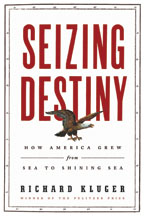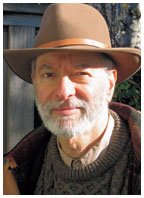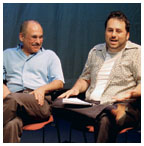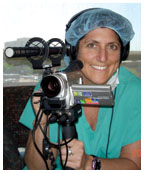October 10, 2007: Books and Arts
Reading Room
America’s land grab
Richard Kluger ’56 examines how the U.S. borders expanded
Joining science and art
Professor Lee Silver collaborates on a provocative play
For a complete list of books received, click here.
Richard Kluger ’56 explores the aggressive and sometimes brutal methods that the United States used to acquire its land and territories. (Jayne Kluger) |
Reading
Room
America’s
land grab
Richard Kluger ’56 examines how the U.S. borders expanded
By Lawrence Otis Graham ’83
Richard Kluger ’56 has made a habit of analyzing important social and historical issues. An English major at Princeton who was chairman of The Daily Princetonian, Kluger has written about the 1954 Supreme Court decision outlawing school segregation in Simple Justice and about the cigarette industry in his 1997 Pulitzer Prize-winning Ashes to Ashes. In his new book, Seizing Destiny: How America Grew from Sea to Shining Sea, he tackles the less-than-admirable means that American political leaders employed to expand the nation’s borders.
 Kluger,
who considers himself a social historian, says he wanted to write a book
that “examined politics as well as the American character.”
Published by Alfred A. Knopf in August, Seizing Destiny provides
a fascinating lesson in geography, politics, and American history from
the early 1500s to the current day, focusing heavily on the 19th century.
Kluger,
who considers himself a social historian, says he wanted to write a book
that “examined politics as well as the American character.”
Published by Alfred A. Knopf in August, Seizing Destiny provides
a fascinating lesson in geography, politics, and American history from
the early 1500s to the current day, focusing heavily on the 19th century.
Clever ironies abound in this text as Kluger identifies the long-embraced American concept of “manifest destiny” as sometimes simply a more polite term for some arrogant and aggressive attempts to deal with Native Americans, Europeans, and others who stood in the way of the United States’ desire to amass the acreage that lay between Maine and California.
Militant diplomacy was used for the acquisition of the Oregon territory by President James K. Polk. In his 1845 inaugural address, he ignored the longstanding joint-occupancy agreement that the British and Americans had lived by in the Oregon territory, and all but declared war by arguing, “Our title to the country of Oregon is clear and unmistakable.” The United States had been quietly encouraging settlers to populate the region with the intent of forcing their way past the British, who left in 1846 instead of fighting.
Polk later used outright war to seize land from Mexico that would become the states of California, Nevada, Arizona, and New Mexico. Polk, who was president from 1845 to 1849, launched the Mexican-American War after Mexico refused to sell him the desired land for $20 million. He sent Gen. Zachary Taylor and his army to the Rio Grande in 1846, provoking Mexico into a fight. Two years later, after he defeated the Mexicans, the triumphant Polk was able to buy the same land for just $15 million. “One of the biggest surprises for me,” explains Kluger, “was that one of our least- profiled presidents — James K. Polk — was the most accomplished negotiator when it came to grabbing major land purchases for our nation.”
Kluger’s book uses maps, timelines, and stories to show how the United States collected its 3.5 million square miles of land. Among the calmer acquisitions were the $23 million Louisiana Purchase from the French (making up all or part of 15 states), the 1867 purchase of Alaska from Russia, and the 1917 purchase of the Virgin Islands from Denmark.
Kluger argues that while the United States displayed great courage in building the nation, it often revealed a self-righteousness that is, he says, “apparent in the way we have dealt with many nations around the world.”
Having written three prior non-fiction books and six novels and served
as an editor at the Wall Street Journal and the New York
Herald Tribune, Kluger doesn’t shy away from revealing some
uncomfortable truths about the complex social and historic fabric of America.
He plans to continue this in his next book, The Eagle Weeps at Medicine
Creek, which explores the relationship between whites and Native
Americans in the 1800s. ![]()
Lawrence Otis Graham ’83 is the author of 14 books, including The Senator and The Socialite and Our Kind of People. He is a contributing editor at Reader’s Digest.
For a complete list of books received, click here.
Professor Lee Silver, left, and playwright Jeremy Kareken discuss their collaboration at a festival for new plays in Minneapolis. (Kevin McLaughlin) |
Joining
science and art
Professor Lee Silver collaborates on a provocative play
One day in 1994, soon after Lee Silver, a professor of molecular biology and public affairs, lectured on the genetic similarity of chimpanzees and humans and the theoretical possibility of producing a hybrid chimp-human, a student who had heard him speak came to his office with an astonishing idea for a thesis project. She proposed being impregnated with the sperm of a chimpanzee, following the development of the chimp-human hybrid, aborting near the end of the pregnancy, and writing up the experiment for her senior thesis. Would Silver be her adviser, she asked?
Silver was speechless.
That incident became the spark for a play Silver co-wrote with a New York actor and playwright, Jeremy Kareken. The play begins with a fictionalized account of that thesis proposal — as a junior at an elite university resembling Princeton suggests impregnating herself with chimp sperm. Silver collaborated with Kareken throughout the scriptwriting process after winning the 2006 Two-Headed Challenge contest, co-sponsored by the Guthrie Theater and the Playwrights’ Center in Minneapolis, which supports development of a play written by a playwright and a collaborator outside the theater world. Two staged readings of their play, The Sweet, Sweet Motherhood, were held in July. Kareken and Silver are revising the script, and their agent is shopping it around to producers.
Silver and Kareken met two years ago when Silver gave a presentation to members of the Sloan Foundation, which is interested in bringing scientific ideas into the theater, and 30 playwrights, including Kareken.
The Sweet, Sweet Motherhood has two characters — the student, Shelley (think Mary Shelley, the author of Frankenstein), and the professor, Henry Stein (think FrankenSTEIN). Shelley has no qualms about using her body to get ahead in the competitive field of academic science. Stein tries to reason with her. Eventually, against his advice, she gets pregnant by having a single sperm injected into an egg.
When the play is produced, an animated PowerPoint presentation will run in the background, providing a visual representation of some of the central scientific themes, such as the similarity of human and chimp DNA sequences, says Silver.
The play asks, “What does it mean to be human?” says Silver, by looking at whether a chimp-human hybrid would be a human or a chimp and examining the genetic similarity between the two species. “This is a very threatening question because of the Judeo-Christian idea that human beings as a species are absolutely distinct from all other species,” he says.
The play looks at the ambiguous relationship between a female student and a male professor — particularly the intense relationship that can develop as a student works with her thesis adviser and can come to view him as a potential lover or father figure. The issue of abortion — and whether to call a fetus “a baby” — also surfaces.
“We took every taboo subject and played with it. It’s a very anti-PC play,” says Silver, who deals with some of the issues raised in the play in his course “Human Genetics, Reproduction, and Public Policy.”
The incident that sparked the play is recorded in his latest book, Challenging Nature: The Clash of Science and Spirituality at the New Frontiers of Life (2006).
The co-author of the play has requested the insertion of a "spoiler alert" in advance of the following paragraph.
The real Princeton student did not proceed with the thesis. In the play, the outcome of Shelley’s experiment is not clear-cut. The Sweet, Sweet Motherhood leaves unanswered questions — whether she got pregnant with a chimp sperm or human sperm, and whether she has “the baby.”
“The play raises a number of ethical and philosophical questions,”
Silver says, “but [it] doesn’t provide any easy answers.”
However, Silver does hope that people will come away with a deeper understanding
of the scientific issues raised, so that they are better able to make
up their own minds. ![]()
By K.F.G.
 Retro
comic strip meets slapstick In PHOOEY!, a new children’s
book illustrated and written by Marc Rosenthal ’71 and published
by Joanna Cotler Books in July, an angry and bored red-headed boy who
complains that “Nothing ever happens around here!” kicks a
can and unknowingly sets in motion a silly series of events — an
elephant escapes from a zoo, peanuts fly through the air, oranges are
sent rolling in the street. Rosenthal’s big comic-style illustrations
bring to mind children’s classics such as Babar and Make Way for
Ducklings. Kirkus Reviews called PHOOEY! “a side-splitting visual
romp” with “a retro comic strip and a classic slapstick premise.”
Rosenthal has illustrated other children’s books, including The
Runaway Beard. His illustrations also appear in The New Yorker, The Atlantic
Monthly, and PAW.
Retro
comic strip meets slapstick In PHOOEY!, a new children’s
book illustrated and written by Marc Rosenthal ’71 and published
by Joanna Cotler Books in July, an angry and bored red-headed boy who
complains that “Nothing ever happens around here!” kicks a
can and unknowingly sets in motion a silly series of events — an
elephant escapes from a zoo, peanuts fly through the air, oranges are
sent rolling in the street. Rosenthal’s big comic-style illustrations
bring to mind children’s classics such as Babar and Make Way for
Ducklings. Kirkus Reviews called PHOOEY! “a side-splitting visual
romp” with “a retro comic strip and a classic slapstick premise.”
Rosenthal has illustrated other children’s books, including The
Runaway Beard. His illustrations also appear in The New Yorker, The Atlantic
Monthly, and PAW.
(Courtesy Deborah Fryer *93) |
Documentary profiles Parkinson’s patient
Deborah Fryer *93’s documentary film, Shaken: Journey into the
Mind of a Parkinson’s Patient, profiles Paul Schroder, who
was diagnosed with Parkinson’s disease in his early 30s and underwent
brain surgery in 2004 at age 43. The film, which Fryer, at right, produced
and directed, follows Schroder into the operating room as doctors implant
electrodes into his brain. The procedure at first pays off, as Schroder
regains the ability to smile, fly-fish, and drive a car. But eventually
he develops an infection in his scalp and the electrodes have to be removed.
The 30-minute film, which is now available on DVD through www.lilafilms.com/shaken.htm, has won a number of awards, including best documentary at the Scinema Science Film Festival, and best short documentary at the Annapolis, New York City VisionFest, and Roshd Inter-national film festivals in 2006. In August, Fryer’s film won an award for its “contribution to social change or a humanitarian effort” in The Accolade, an international competition. Shaken has been screened on Capitol Hill, in universities, and at Parkinson’s support groups. Fryer is expanding the half-hour film into a feature-length version that will address various stages of the disease and treatment options and will follow Schroder as he prepares for a second brain surgery.
 Cornel
West *80 addresses “the man” In his new CD, Never Forget:
A Journey of Revelations, Cornel West *80 provides music-infused
political commentary with contributors including hip-hop and R&B artists
such as Prince, Andre 3000, Talib Kweli, and Jill Scott. In one of the
14 tracks on the CD, released in August by Hidden Beach Recordings, Prince
sings “Dear Mr. Man” — which takes a critical look at
economic inequities and government corruption — while West interjects
with spoken-word commentary. West, a Princeton professor in the Center
for African American Studies, says, “We tired of y’all spying
on fellow citizens/we tired of ya’ll lying to justify war/we tired
of ya’ll torturing innocent people.” Other issues included
on the tracks are racial profiling and the “N-Word.” In “9/11”
West equates America’s post-Sept. 11 fears to being black in America.
He says, “To be a nigger in America is to be unsafe, unprotected,
subject to random violence and hated. Since 9/11 the whole nation has
been niggerized.” West hopes that Never Forget educates
young people who might be more inclined to listen to a CD than to read
one of his books. “My books provide a readable education,”
says West, “and my CDs provide a danceable education.”
Cornel
West *80 addresses “the man” In his new CD, Never Forget:
A Journey of Revelations, Cornel West *80 provides music-infused
political commentary with contributors including hip-hop and R&B artists
such as Prince, Andre 3000, Talib Kweli, and Jill Scott. In one of the
14 tracks on the CD, released in August by Hidden Beach Recordings, Prince
sings “Dear Mr. Man” — which takes a critical look at
economic inequities and government corruption — while West interjects
with spoken-word commentary. West, a Princeton professor in the Center
for African American Studies, says, “We tired of y’all spying
on fellow citizens/we tired of ya’ll lying to justify war/we tired
of ya’ll torturing innocent people.” Other issues included
on the tracks are racial profiling and the “N-Word.” In “9/11”
West equates America’s post-Sept. 11 fears to being black in America.
He says, “To be a nigger in America is to be unsafe, unprotected,
subject to random violence and hated. Since 9/11 the whole nation has
been niggerized.” West hopes that Never Forget educates
young people who might be more inclined to listen to a CD than to read
one of his books. “My books provide a readable education,”
says West, “and my CDs provide a danceable education.” ![]()
By K.F.G.



